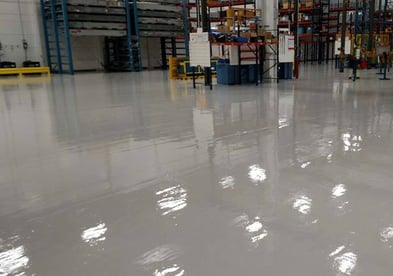 When you invest in the materials and labor to install a new industrial floor coating for your factory, warehouse, or commercial space, the last thing you want is for that coating to peel up, bubble, or otherwise fail you.
When you invest in the materials and labor to install a new industrial floor coating for your factory, warehouse, or commercial space, the last thing you want is for that coating to peel up, bubble, or otherwise fail you.
Here are four steps for choosing the right industrial floor coating:
Consider the demands of your work environment
Depending on your industry, your floors may take serious abuse over the years. Consider the daily stresses your floors take, which may include:
- Occasional chemical spills
- Abrasive cleaners
- Heavy foot traffic
- Forklift or other vehicle traffic
- Movement of heavy items that may be dropped
- Exposure to sunlight
- Extreme temperature shifts
- High levels of moisture
The good news is there are floor coatings on the market that can be formulated to withstand any of these challenges—but you need to know exactly which stresses you need to protect against.
Sometimes, the possible issues in the environment are not immediately obvious. This is why it’s so important to have a thorough on-site inspection and consultation with a floor coating specialist, who can ensure that all possible factors are taken into account before the coating selection is made.
Consider the condition of your floor
Is your floor made of concrete, steel, hardwood, tile, or a combination of these? The type of flooring you have dictates the kind of surface coatings that will work. For instance, enamel finishes are too vulnerable to moisture to be used with most concrete surfaces.
Many industrial floors are made of concrete—but not all concrete is created equal. You’ll need to take into account the age, density, and structural soundness of your concrete. It’s also important to get a professional moisture test done, since an excess of water vapor can wreak havoc on certain floor coatings.
You also need to consider any coatings or treatment the floor has undergone in the past. Are there still remnants of a previous coating on the surface of your floor? This will affect the installation of a new coating.
Prepare the floor surface properly
Once the floor coating has been chosen, simply finding someone to lay it down does not guarantee that it will work. Depending on what you choose, the coating may not bond properly to the floor in the presence of oil stains, dust or debris, or unchecked moisture issues.
A floor coating applied to a surface that has not been properly cleaned and prepared is far more likely to form bubbles, blisters, areas of peeling, or other unsightly failures that can negatively affect the floor’s performance.
Get an expert installer
Installing a new floor coating represents an investment of your company’s time and resources, so it’s worth getting the job done right the first time. An amateur installation may result in bonding or curing failures, which will not only look unattractive but compromise the floor’s ability to stand up to the environmental stresses it’s designed for.
Floor coatings do not behave like most paints, and often require different techniques for installation. Hiring an experienced floor coating contractor will ensure you avoid beginner’s pitfalls and errors than can ruin a floor coating installation, and a good contractor will be able to complete the installation in a time- and cost-effective way.
If your facility is located in the Carolinas, northern Georgia, or eastern Tennessee, CPC Floor Coatings can inspect your facility, help you choose the right industrial floor coating based on your needs, and install it with the help of our seasoned crews.
We would love to speak with you about your facility’s needs and what options we have to match your requirements and budget. Give us a call at (864) 855-0600 or contact us online today.

